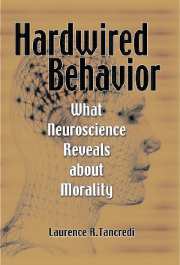Book contents
- Frontmatter
- Contents
- Preface
- Acknowledgments
- 1 Neuroscience and Morality
- 2 Morality and the Mind
- 3 Beyond the Mind Zone
- 4 The Moral Brain
- 5 Bad without Conscience
- 6 The Biology of Choice
- 7 Sex and the Single Moral Code
- 8 Brain Biology and Sex
- 9 Deception
- 10 The Biology of Money
- 11 The Bad and the Mad
- 12 Creating a Moral Brain
- Notes
- Glossary
- Index
12 - Creating a Moral Brain
Published online by Cambridge University Press: 13 October 2009
- Frontmatter
- Contents
- Preface
- Acknowledgments
- 1 Neuroscience and Morality
- 2 Morality and the Mind
- 3 Beyond the Mind Zone
- 4 The Moral Brain
- 5 Bad without Conscience
- 6 The Biology of Choice
- 7 Sex and the Single Moral Code
- 8 Brain Biology and Sex
- 9 Deception
- 10 The Biology of Money
- 11 The Bad and the Mad
- 12 Creating a Moral Brain
- Notes
- Glossary
- Index
Summary
Sometime before the end of the twenty-first century, will neuroscientific discoveries and modern medical technology allow us to fulfill the utopian dream of a morally “perfect” society? Will the Seven Deadly Sins be banished from the human condition? Since many of those “sins” are already being understood as originating in biological differences, it's not much of a stretch to imagine a future focused on correcting the biology and thereby eliminating the prospects of these sins. So let's imagine (fast-forward, please). …
In the election of a century from now, legislative reformists promoting The New Society take over the government. They are convinced that the brain directs the mind, that it is hardwired, that genetics creates the foundation of this wiring, and that the tuning-up process involves a delicate exchange between environment and brain biology.
Imagine now that headway has been made in the many ways that biological mistakes can be corrected or counterbalanced so that the brain operates according to the biology now known to underlie “mainstream” morality.
But during their campaign, our future legislators are questioned hard about time-honored notions of free will, individual responsibility, and the ability of human beings to change their behavior just by learning and accepting basic precepts of social morality. The reformists face the fact that the public's supposedly sophisticated understanding of brain science did not discard the notion that our species basically has control over its thoughts and intentions and, therefore, should be held individually responsible for immoral and illegal actions.
Despite that difficulty, the reformist candidates manage to convince most voters that they understand such concerns but are on top of the scientific knowledge about the brain.
- Type
- Chapter
- Information
- Hardwired BehaviorWhat Neuroscience Reveals about Morality, pp. 162 - 176Publisher: Cambridge University PressPrint publication year: 2005
- 1
- Cited by



